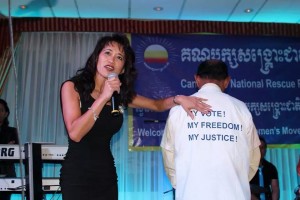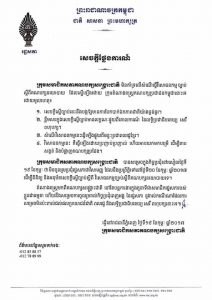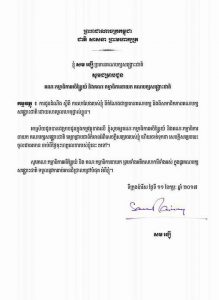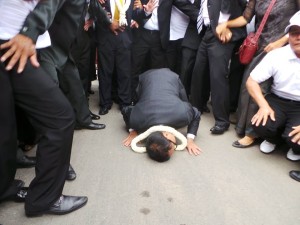Op-Ed: The CEROC
Lee Morgenbesser, an expert on authoritarian regimes, said the elections would “absolutely not” be free and fair, even with the CNRP’s participation.
 “The minimum standard requires that all parties and candidates be subject to the same procedures for registering and appearing on the ballot; all campaign and compete on a level playing field; all have equal access to the media; voters be free to vote for their preferred candidates; and official results accurately reflect the votes that were cast,” he explained.
“The minimum standard requires that all parties and candidates be subject to the same procedures for registering and appearing on the ballot; all campaign and compete on a level playing field; all have equal access to the media; voters be free to vote for their preferred candidates; and official results accurately reflect the votes that were cast,” he explained.
Cambodia has failed to satisfy each of these requirements – and few would be resolved even if the CNRP were revived.
===
The government has even abandoned symbolic gestures such as Phnom Penh’s “Freedom Park,” established in 2010 to satisfy the country’s Law on Peaceful Demonstrations. The park, which hosted mass protests following the disputed 2013 elections, is supposed to be a designated area for citizens to gather in protest. It was closed down after Hun Sen ordered it to be relocated to the outskirts of the city, around 4 kilometers away from the original park. The relocation seems to violate a clause in the law that requires the park be easily accessible to the public. Today, 10-foot high metal walls have cropped up around the park, blocking access entirely.
The closure of Freedom Park may make little difference, given that Hun Sen has expressed his willingness to kill 100-200 people to maintain stability, and Ministry of Interior spokesman Khieu Sopheak bragged that nobody “dares” to protest.
The forced exclusion of the CNRP has understandably grabbed headlines. But the restrictions on free speech, media, civil society, freedoms of association and assembly, and the possible absence of election observers indicate that even if the CNRP were miraculously resurrected, the Cambodian elections would still be a far cry from free and fair.
===
If passed, the bill must be enacted into law within 180 days, although it is not yet clear when the House will vote on the legislation.
The Cambodia Democracy Act 2018 states that democracy has failed in Cambodia despite “decades of international attention and assistance,” and condemns the deteriorating situation for political rights, civil society and the free press.
The legislation’s co-sponsor, Alan Lowenthal, called the bill a “major step” towards holding Hun Sen and his associates accountable.
“I believe these sanctions will get the attention of the Cambodian government,” Lowenthal said in a statement, stressing that the US and world must act urgently. “I also believe that our action today will encourage other members of the international community to take similar actions and bring additional pressure to bear on Hun Sen.”
Cambodian officials identified as being involved in undermining democracy are already banned from traveling to the US following a December decree from the State Department.
There are now bills in both the US Senate and House that would impose asset freezes, although the Senate bill goes even further by requiring that the US oppose loans to Cambodia from international financial institutions. It also bans any negotiations on the more than US$500 million debt Cambodia owes America dating back to the 1970s.
Cambodian officials’ assets are difficult to track given that asset “declarations” sit in a closed envelope in the government’s Anti-Corruption Unit. Some high-ranking officials like Siphan are dual US-Cambodian citizens.
===
Rainsy also said Hun Sen “is holding his people hostage and blackmailing donor nations” by flaunting the negative effects sanctions would have on average Cambodians.
“I am calling on the Cambodian people to be prepared for some additional hardship in our current fight for a democratic and peaceful change,” he said. “As in any battle for a just cause, a short-term sacrifice may be required to secure a better future.”
While the US hasn’t threatened the garment industry specifically, officials have warned that further action is on the cards.
Sophal foresees more sanctions coming after the July elections, which he doesn’t expect the US to recognize as free, fair or legitimate. “It’s clear as day the US will reject the results of the election and I expect more sanctions as Cambodian democracy is not only undermined but completely gutted.”
====
Voters and abstainers
Rather than a competition between the CPP and another party, the election is shaping up to be a competition between voters and abstainers. With the CPP all-but-guaranteed a win, it is voter turnout that counts. As Cambodian political analyst Meas Nee points out, the CPP’s concern is no longer winning the election, but maintaining legitimacy and “minimum recognition” from the international community.





 Actually, Sam Rainsy announced his resignation from party’s Presidency of CNRP this February 11, 2017 is to intentionally save his party from dissolving attempted by Prime Minister Hun Sen. Hun Sen had repeatedly warned on amending the political party law to ban convicted individuals from entering top leadership of the party as well as to dissolve the party from such convicted degree if found. Strategically, Sam Rainsy stepped ahead of Hun Sen’s authoritarianism and narcissism for the upcoming elections i.e. commune election 2017 and national election 2018. Sam Rainsy has been convicted by a defamation lawsuit against him and there are many lawsuits in row to trial him. Every Cambodian knows that those charges are politically motivated.
Actually, Sam Rainsy announced his resignation from party’s Presidency of CNRP this February 11, 2017 is to intentionally save his party from dissolving attempted by Prime Minister Hun Sen. Hun Sen had repeatedly warned on amending the political party law to ban convicted individuals from entering top leadership of the party as well as to dissolve the party from such convicted degree if found. Strategically, Sam Rainsy stepped ahead of Hun Sen’s authoritarianism and narcissism for the upcoming elections i.e. commune election 2017 and national election 2018. Sam Rainsy has been convicted by a defamation lawsuit against him and there are many lawsuits in row to trial him. Every Cambodian knows that those charges are politically motivated. Beside of personal integrity, honesty, sacrifice and genuine patriotism for his nation, Sam Rainsy is vivid and intellectual in handling political truces with Hun Sen. With his over 27 years experience in political leadership as opposition party particularly competing with Hun Sen, his effort yielded in 2013 as the government effort to disqualify him from political leadership has impregnably backfired Hun Sen. Evidently, sea of people gathered in tsunamic-like crowd to welcome him back home at the airport few days before the election campaign in 2013, was a historic momentum.
Beside of personal integrity, honesty, sacrifice and genuine patriotism for his nation, Sam Rainsy is vivid and intellectual in handling political truces with Hun Sen. With his over 27 years experience in political leadership as opposition party particularly competing with Hun Sen, his effort yielded in 2013 as the government effort to disqualify him from political leadership has impregnably backfired Hun Sen. Evidently, sea of people gathered in tsunamic-like crowd to welcome him back home at the airport few days before the election campaign in 2013, was a historic momentum.